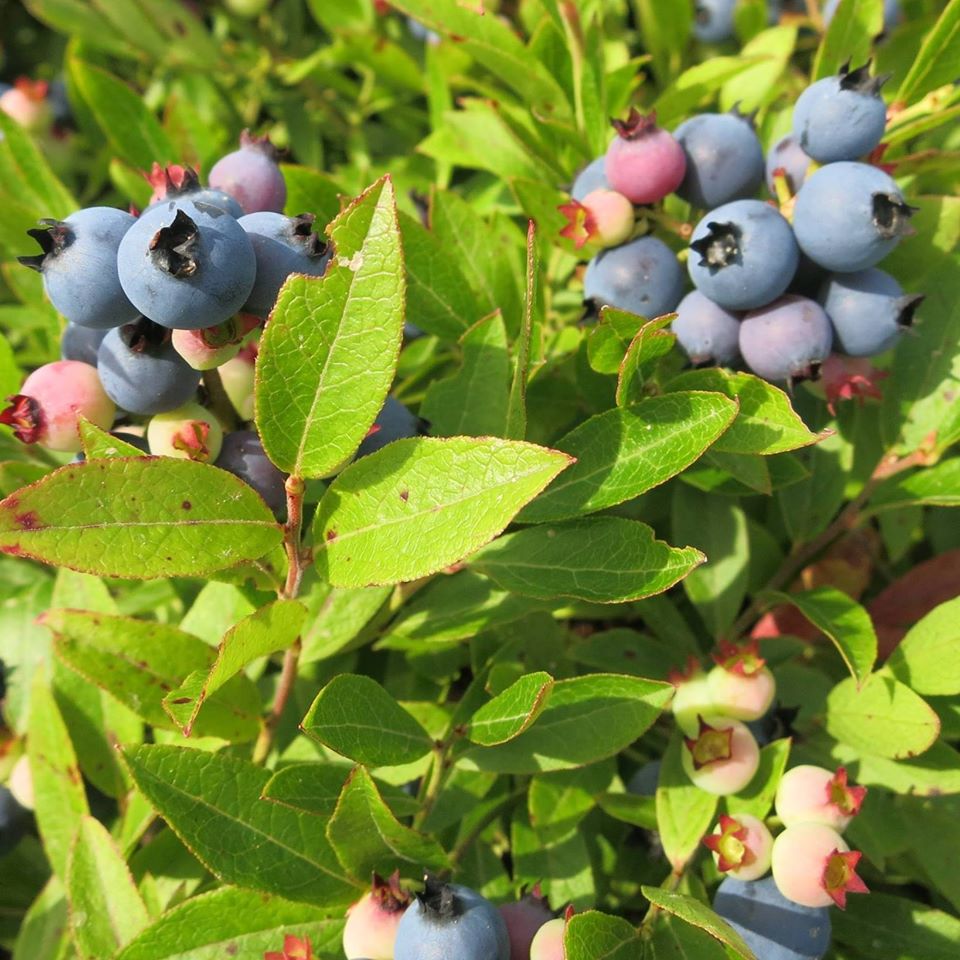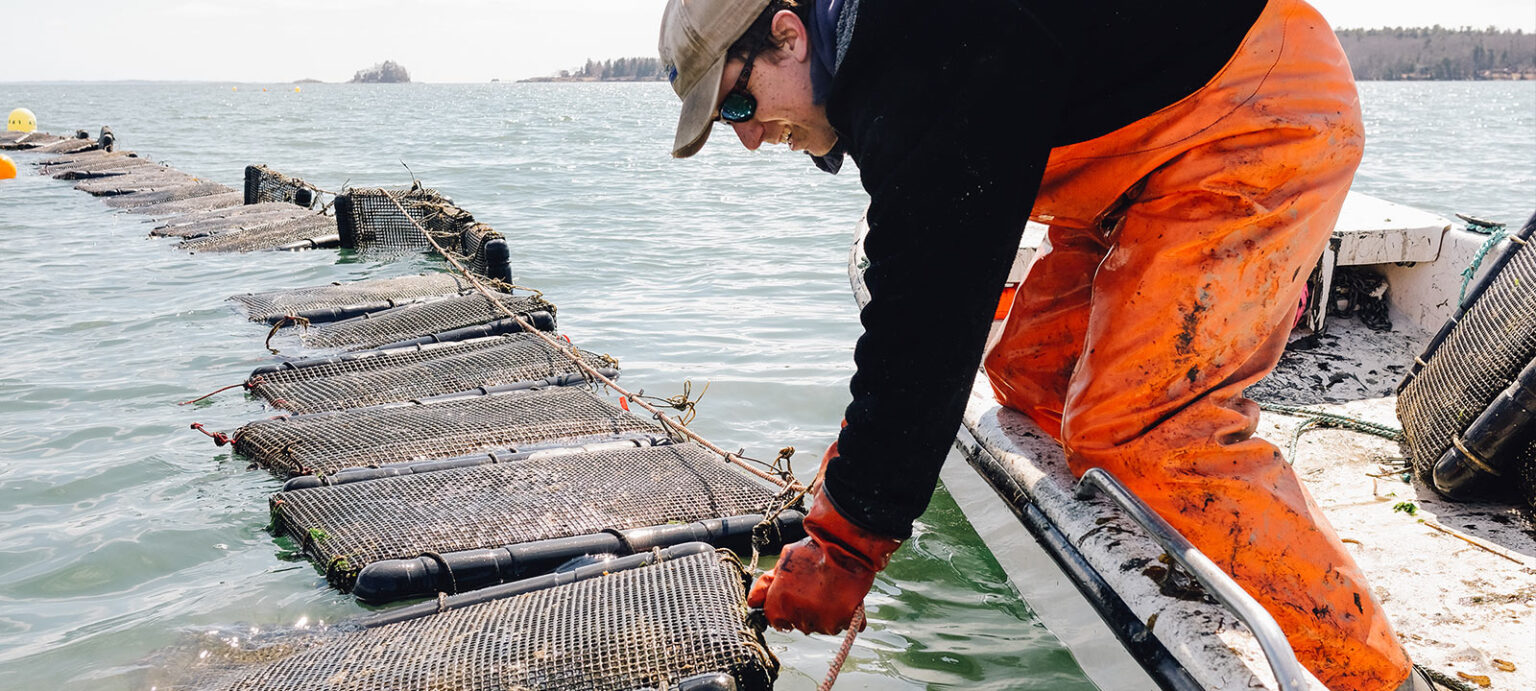September 08, 2020
The Blueberries of Welch Farm
Tourism is one of Maine’s largest industries, supporting nearly 110,000 jobs, or roughly 1 out of every 6 jobs in the state, and tourists spent over $6.2 billion dollars in Maine in 2018, according to the Maine Office of Tourism. There’s a reason we call ourselves Vacationland.
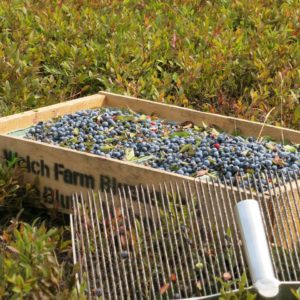
But what is Vacationland, when many people aren’t leaving
their houses, let alone going on vacation? How does this vital
Maine industry manage business in the time of COVID?
Lisa Hanscom, a client of the CEI Women’s Business Center, shared how she and her team at Welch Farm in Roque Bluffs, are adjusting to the “new normal” this season. Lisa is co-owner and manager of Welch Farm in Roque Bluffs, a sixth-generation family-owned wild blueberry farm (another iconic Maine industry) that hosts guests for overnight stays and farm tours, in addition to selling blueberries, jams, and jellies. The Welch Farm property has served as a farm since the 1700s and shifted to commercial wild blueberry production in the 1920s.
“Farmers are some of the smartest businesspeople on earth,” Lisa says. “They have to keep changing to stay in business and thrive.” That business acumen, plus the pressure of holding onto the family farm—“You don’t want a generational farm to be lost on your watch!”—drove Lisa to make some changes when she took over as farm manager in 2008, including expanding the farm’s offerings to include agritourism and “value-added” products like jams and jellies. As she continues to collaborate with her
father, Wayne, who ran the business he inherited from his grandparents
Frank and Mary Welch, they think together about how to adapt as demands change and harvests shift each season.
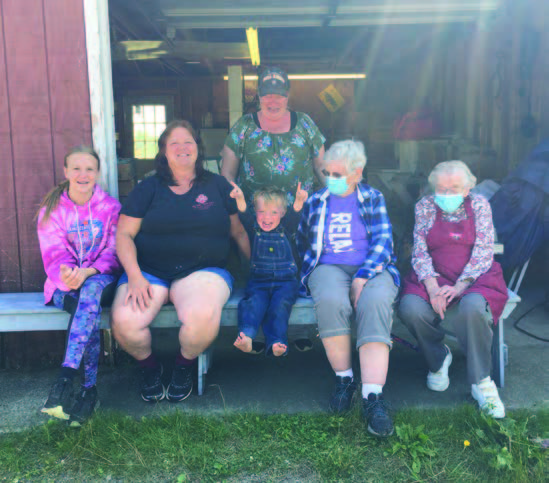
“Tourism is an important part of our business model now,” she added. “We’ve revamped ourselves so the farm includes an element of tourism, where it didn’t always. Who thought a farm would be a tourist thing? Visitors like that they can visit a working blueberry farm and get in-depth history about farming and the region. Visitors usually say that they like getting to know about us, the farmers, and the industry up close.” The cabins are booked through September, with many guests from southern Maine, and the rest from Vermont and New Hampshire. She has streamlined the items in the cabins so as not to have as much to clean and sanitize, and most guests are staying two nights or more. Some have done entire 14-day quarantines there. All in all, it’s a very good place for a “staycation.”
Visitors learn about Welch Farm through profiles in Bangor Metro and Tripadvisor reviews, by visiting nearby Roque Bluffs State Park, and from readers interested in seeing the setting of their favorite Maine-based mystery novels. Some of the biggest challenges of the tourism side of the
business have been balancing it alongside peak blueberry growing and harvesting. Now COVID-19 has brought new questions. While the delay in the start of tourist season has meant more farm work can be done, Lisa wonders how they’ll manage when the most people arrive. She asks herself questions like: How do we make people feel safe and still engaged in the touring and visiting? How are we going to provide more non-contact curbside pick-up? How do we manage Farmers Markets?
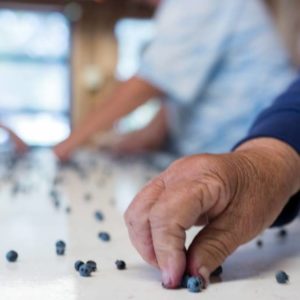
A specific concern comes up regarding the fresh pack shed—“The women working in the shed are in their 80s and very friendly!” Lisa says, realizing it’s both a blessing and, in the current situation, an extra challenge. LouAnn and Hannah, the youngest of the crew and grandmother and granddaughter, are local and new to the fresh pack system. Sonya (age 83)
and Connie (age 89) have both been a part of the fresh pack line family for several years. Alex, Lisa’s daughter, has been involved forever as the fifth generation participant along with her son Leom—the sixth generation of Welch Farm farmers. Dot Mae, at age 90 would have returned this season had it not been for the health of her husband whom she feared would be at risk if she ventured far from home.
Lisa reiterates that, “No blueberry season is ever the same.” There are always little issues that need to be solved. They get solved and then they reappear a few years later in a different way and need new or different tweaks.
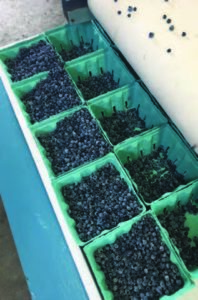
COVID-19 is definitely more than the usual little issue, and thus requires more than the usual resourcefulness. The epidemic impacts the total blueberry process. It means longer time to clean and requirements such as masks and extra sanitizer. It has altered access to the pack shed for customer “barnside” sales. Lisa was always meticulous about keeping a clean
workplace, but it does take more time to pick, clean, and pack, and clean up well at the end of every shift. She concedes that it is more draining than usual because extra time and effort is needed for planning and just thinking through strategy.
While the family has seen sales channels shift over generations, and now again with COVID restrictions, somehow blueberries are always in demand, especially as people are baking up a storm. More locals and visitors staying in the area are buying direct. Wyman’s, the state’s largest wild blueberry farmer and distributor, continues to be their largest buyer with a consistent supply being sold as far as New York City by a local purveyor. Lisa and her crew continue to sell right at the farm and through local Farmers Markets by the quart or 5-pound family pack boxes. So-called “rejects” that may look
imperfect but are still quite edible go to a winemaker in New Hampshire. And, of course, all of the famous blueberry pies at Helen’s Restaurant on Main Street in nearby Machias are made with Welch Farm berries.
Lisa is determined to meet the challenges head on. “Sometimes you must change direction quickly and adapt. Even though you’re running a family farm, you need to think quickly and be willing to try new things or adapt how you’re doing business. I personally enjoy when people leave here with
knowledge and more understanding about the farm and the business. That’s why I started this. I will change the wild blueberry business one person at a time!”
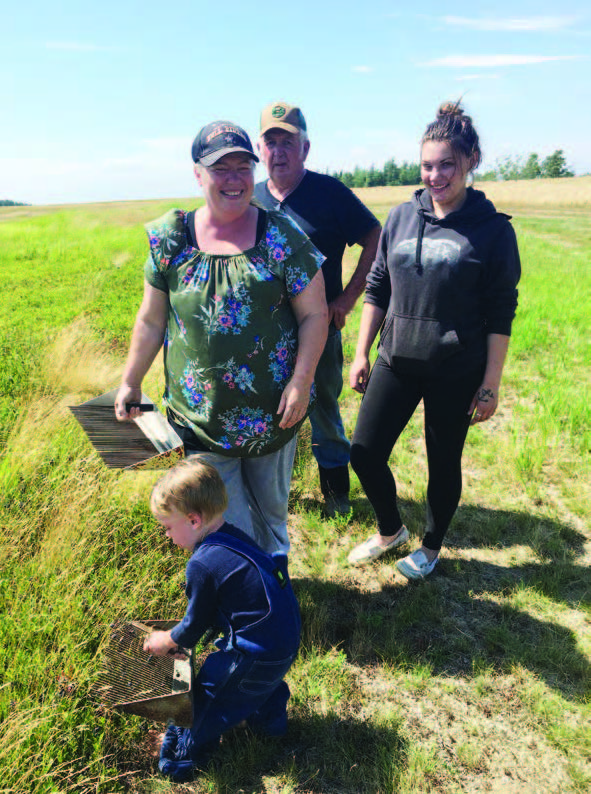
This story originally appeared in the September 2020 edition of Maine Women Magazine, written by Ruth Feldman of the CEI Women’s Business Center and is republished here with permission.
LEARN MORE ABOUT WELCH FARM
- Website: http://welchfarm.com/
- Facebook: https://www.facebook.com/WelchFarm/
LOOKING TO IMPROVE YOUR BUSINESS KNOW-HOW?
CEI offers a wide range of assistance to emerging and existing business owners. Through one-on-one consultation, training, workshops, seminars, peer networks and other services, CEI helps individuals across the state get the information they need to start or expand their business. In addition to providing general business assistance, CEI has programs for women; marine-related businesses; farms; ag and food businesses; and refugees and immigrants.
Check out the full range of CEI’s Business Advising offerings at https://www.ceimaine.org/advising
